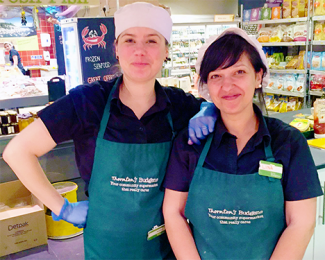WRAP ATTACK
Fighting global warming one corner grocery at a time

Two workers at Thornton’s plastic-free grocery in London, England
JUST DO IT! The slogan they used to sell us tons of shit that wrecks the environment may be the best advice on how we can actually do something direct to protect our environment.
Andrew Thornton just did it. He got rid of as much plastic packaging as he could in his grocery store in England. It wasn’t part of some global effort. It wasn’t sanctioned by some panel of international experts after years of high-level consultation and negotiation. He wasn’t prompted by some manifesto. He just did it.
One citizen acting out. One citizen who could do something direct on something important to him—and the world.
Thornton owns a grocery store in London, England, part of the Budgens mid-size chain. He recently turned his store into one of the first supermarkets in the world to introduce completely plastic-free zones throughout the store.
A plastic-free zone
In just 10 weeks, he eliminated the use of plastic packaging for nearly 2,000 products including fruit, vegetables, bacon, fish, baked goods, cheese and takeout food.
Thornton was recently featured on the the CBC TV show Marketplace. “We are trashing the planet, and for me, plastic has become … one of the things that’s wrong with our society today,” he told show producers.
“We took action because we could and we felt we could make a difference.”
Fruit and vegetables in his store are now packaged with compostable beechwood netting made from sawmill offcuts—or have no packaging at all. Bakery products are sold as is, or packaged in paper, and cheese, fish and some meats are wrapped in wax paper or compostable cellulose wrap.
The changes he made cost him next to nothing. His sales on some items actually increased.
“Our customers love it,” said Thornton, who plans to have the whole store “virtually plastic-free” in three years.
Just get rid of it
But to take those further steps, he says he will need co-operation from major suppliers like Nestle, Unilever and Coca-Cola to find alternative packaging for their products.
Frankie Gillard of the environmental group A Plastic Planet, oversaw the project at Thornton’s Budgens. She says big supermarkets have the power to get major brands to switch to more sustainable packaging methods.
“The big supermarkets have the power to make or break a brand. So, of course, they have the power to say how it should be packaged.”
“You basically say, ‘We’re going to de-list your product if you don’t eliminate plastic,” she said. “You’ve got to tell them, ‘If you don’t get rid of the plastic, we’ll get rid of you.’”
Manufacturers have produced 8.3 billion tonnes of plastic since mass production began in the 1950s. In Canada, just 11 per cent of plastic gets recycled, and globally that number drops to nine per cent.
Plastic has been found in the Arctic, in the deepest trenches of the oceans, in the air and in our food. Scientists estimate that, by 2050, there will be more tons of plastic in the world’s oceans than tons of fish.
But reducing the amount we use as consumers is difficult when retailers provide few alternatives.
‘Pre-peeled’ oranges and other absurdities
The mania for plastic wrapping food has reached the absurd. Coconuts, bananas and avocados are regularly wrapped tight. In 2016 Whole Foods offered “pre-peeled” oranges in plastic containers. Consumer backlash quickly forced the chain to take the item off its shelves.
Whole Foods markets offered $6 ‘pre-peeled” oranges in plastic containers
The shelves at Canadian grocery giants Loblaws and Sobeys are filled with plastic-wrapped products.
Fruit, vegetables, eggs, bakery products and even coconuts are wrapped in plastic packaging. Meat and fish are sold in difficult-to-recycle foam trays, and ready-made takeout food is sold in black plastic trays that aren’t accepted for recycling in most of Canada.
Both stores also still provide customers with single-use plastic shopping bags, although Loblaws says it provides a billion fewer bags a year since introducing a small fee in 2009.
Loblaws and Sobeys are the source of a huge amount of plastic packaging. But if the two largest Canadian-owned supermarket chains have targets to reduce the amount of plastic packaging they use, and plastic products they sell, they have not made those targets public.
For Andrew Thornton and Frankie Gillard the lesson is plain: Just do it. Don’t wait on politicians or corporations or outside campaigners to give you permission: Just do it.
“If we … can do this in 10 weeks, what could a Loblaws, or a Tesco, or a Walmart do if they put all their resources behind it?” says Thornton.
The ease and success of what Thornton did is an example of what one or two determined people can do. It stands as an example of how everyday people can take direct action to combat global warming when all the "official" operatives and operations can't or won't.
- 30 -












Add new comment